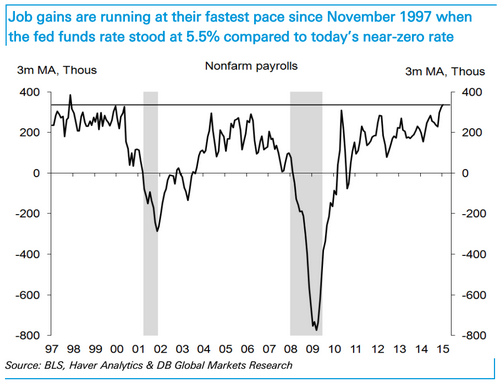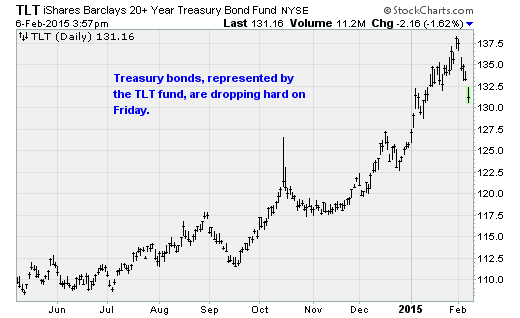What Wall Street fears in the surging job market
On the surface, it should've been all sunshine and rainbows for Wall Street on Friday after another strong jobs report: Payrolls swelled by 257,000 positions in January. Along with upward revisions to November and December, that capped the best three-month run for the labor market since 1997, with more than 1 million jobs created.
The unemployment rate ticked up slightly as idled workers attracted by job prospects entered the workforce, which pushed up the labor participation rate. It's all impressive stuff.
And as I wrote yesterday, this increases the odds that long forlorn wages will finally start rising later this year. Average hourly earnings increased 0.5 percent in January due, in part, to state minimum wage hikes. Societe Generale's Brian Jones noted that the closely followed nominal compensation measure has increased to 2.2 percent on a year-over-year basis in what he's labeled "a wage increase worth waiting for."
And yet, after an initial move higher, stocks slumped to the downside to break a four-day winning streak, with the three major indexes sliding 0.3 percent to 0.4 percent by Friday's close.
Why?
Sure, the labor market's accelerated progress is great news for Main Street, with workers on the verge of enjoying leverage over employers for the first time since the Great Recession. But Wall Street is worried about what this will mean for corporate profitability as well as for monetary policy, with the Federal Reserve on the verge of its first interest rate hike since 2006.
Other markets warned of this first, with Treasury bonds and precious metals getting slammed at the open. In fact, Treasury yields -- which have an inverse relationship to prices -- soared by the most since January 2009 in percentage terms. The two-year yield, which is more sensitive to near-term movements in Fed policy, jumped by 39 percent this week -- its largest move on record.
The viciousness of these moves is being driven by what had been a large gap between the Federal Reserve's own forecasts for the future path of interest rates and the bond market's dour outlook. To the consternation of many, the Fed has been talking up the strength of the economy and job market for months. Bond traders, on the other hand, were maintaining a much more pessimistic outlook.
Through the beginning of the month, the trade was to pile into long-term government bonds on the expectations that either the Fed would blink and postpone its rate hikes, or that it would go ahead with the rate hikes and be forced to quickly backtrack. This dynamic hasn't been happening only here. It's a global phenomenon with many core eurozone sovereign bond yields in outright negative territory. Even a corporate issuer, Swiss food behemoth Nestle, has seen its bonds trade with negative yields.
As for corporate profits, the job market's ongoing tightening and the appearance of wage inflation could have a dampening effect on earnings growth this year. A big reason why corporate profits have been so strong in this economic cycle has been the ability of businesses to keep a lid on labor costs. That's set to change.
These two dynamics -- changing interest rate expectations and wage inflation -- are spooking the markets. Whether these fears are justified won't be known until Fed Chairman Janet Yellen delivers her regular semi-annual monetary policy report to Congress on Feb. 24 and 25.
Joseph LaVorgna at Deutsche Bank believes she could hint that the "patient" language could be removed from the Fed's policy statement -- which roughly translates into a two-meeting gap before the first rate hike -- as soon as the March meeting. Based on an analysis of spare capacity in the job market as well as inflation, LaVorgna is looking for short-term rates to rise from zero to near 1 percent by the end of the year.


